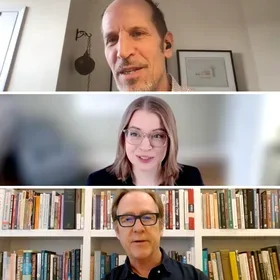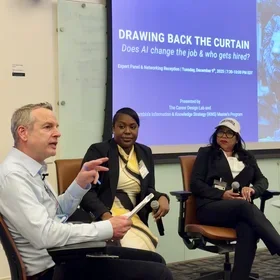Grant Son, Senior Lecturer in the Discipline of Sports Management, will join the team of judges for The Greater Good Challenge, a business pitch competition hosted by the Career Design Lab and made possible with support from the Beba Foundation and Turkish Philanthropy Funds.
Professor Son previously served as CEO of a startup he grew to become a top 10 sports technology company acquired by ESPN where he raised three rounds of venture funding (series A, series B, and series C) after an initial seed financing. (As a frame of reference, less than 10% of CEOs that have raised a seed round of financing are able to raise three additional rounds of financing.) Son has served as judge for the finals or semi-finals for the venture competitions at Columbia and Penn/Wharton School for the past five years. He is a graduate of both the University of Pennsylvania and Columbia Business School. Son has also served as Entrepreneur in Residence (EIR) for the Wharton School as well as EIR for the Wharton Social Impact Initiative.
We asked Son about his role in The Greater Good Challenge, how to make opportunities for innovation more accessible, and what advice he has for students and alumni interested in successfully pursuing entrepreneurship in their careers.
What are you hoping to see among the contest submissions?
I expect that we will see a glimpse of our next generation of innovators and entrepreneurs working to enhance the global greater good. I am honored to have taught entrepreneurship twelve times in both the business program and the sports management program at SPS. One third of the US population has had a startup idea in the last five years, but only half do basic followup. As a former CEO of a startup I grew to become a top 10 sports technology company, I want to make the path to entrepreneurship accessible and as an academic, I want to make the process more framework-driven.
Are entrepreneurs born and not made? Can entrepreneurship and innovation be taught?
There is an old belief that entrepreneurs are born and not made. That is completely incorrect. And, if an entrepreneur can be made, that means an entrepreneur can be taught. We can teach the entrepreneurial mindset. Data supports that when people learn to be better entrepreneurs and innovators, their companies do better. The companies produce higher revenues and are more likely to do well.
How do we make entrepreneurship and innovation more accessible?
Students interested in entrepreneurship and innovation often look at very successful past founders. But the problem is, those successful past founders tend to look very similar to each other. They often think of Bill Gates, Mark Zuckerberg, or Elon Musk as they look at media-driven stereotypes: male, young, sometimes college dropouts with a technical background. However, research shows that this is not the best or only model to be a successful entrepreneur or innovator. As a result, people who might otherwise enter entrepreneurship or a career around innovation are discouraged because they don't resemble those people. My role is to make entrepreneurship and innovation more accessible by teaching successful frameworks used by entrepreneurs that are diverse and inclusive.
The secret to success of entrepreneurship is not the lone genius working in a lab that comes up with an invention, but it is the innovator who creates an idea, who builds a team, and who can transition from innovator to operator to lead an organization.
— Grant Son, Senior Lecturer in Sports Management and Judge of The Greater Good Competition
What do you think makes Columbia SPS uniquely positioned to problem-solve in the current environment?
Columbia University is one of the world's top schools for aspiring entrepreneurs. The secret to success of entrepreneurship is not the lone genius working in a lab that comes up with an invention, but it is the innovator who creates an idea, who builds a team, and who can transition from innovator to operator to lead an organization. I teach students the skills to help them through their journey. Those skills are valued in startups just as much as they are in the corporate world.
At SPS, we have a deep roster of smart and creative learners in our various programs with diverse and global experiences; many are already involved in entrepreneurship.
Here are a few of my current and previous students and their work:
- Marissa Cuevas Flores, '17SPS, Sustainability Management, is Founder and CEO of MicroTERRA. Her company uses biotechnology to create circular economy solutions for water with a positive social and environmental impact. MicroTERRA is supported by Echoing Green, National Geographic, Techstars, and the Nature Conservancy, as well as Columbia Business School's Tamer Center, just to name a few.
- Layden Williams, '22SPS, Sports Management, is the publisher of a full-service book publishing company, Forward Direction, which specializes in autobiographies, children's books, and sports memoirs.
- Khamarr Smith, '22SPS, Sports Management, is developing a video streaming application that revolutionizes engagement between creators and subscribers. Unlike YouTube and Quibi, the app focuses on the growing market for amateur comedy sketches by creators of color.
Why a pitch competition?
As a former startup CEO, as a CEO of a venture firm, as a board member and advisor to dozens of startups, I understand the importance of the art of pitching. In all of my classes, I place a heavy focus on pitching. I teach a two sentence pitch in entrepreneurship. I teach a two sentence positioning statement in marketing. And, I teach an eight minute pitch in my supervised research courses. As Steve Jobs once said, “Simple can be harder than complex: You have to work hard to get your thinking clean to make it simple. But it’s worth it in the end because once you get there, you can move mountains.”
A pitch competition is a standard format in entrepreneurship as it allows outsiders to quickly evaluate the opportunity based upon the ability of the entrepreneur to distill the most critical elements of the venture and provides insight as to the founder's ability to manage the future of their venture.
Do you have to have a new idea?
There's no such thing as a new idea. I look for good ideas, large markets, a point of differentiation, and great execution as the keys to a successful startup. When Drew Houston launched Dropbox, there were eighty technology companies already offering a competitive solution to digital storage. Dropbox had a point of differentiation because Houston figured out the one thing that the world's top technology companies were not doing. What is your point of differentiation?
What separates a good startup from a generic one?
Moving from the idea phase to customer discovery is the "crossing the chasm" moment for early founders. The co-founders for Rent the Runway, Jennifer Hyman and Jennifer Fleiss, knew nothing about fashion or technology, but they navigated the customer discovery process by taking a series of small steps to first acquire customer knowledge and then acquire paying customers.
Do you have advice for early founders?
I work with dozens of early stage entrepreneurs and growth stage companies. I treat every meeting like a board of directors' meeting. When I work with entrepreneurs, I always begin the conversation by asking them to look backwards and tell me their top three accomplishments and then to look forward and list their three most important goals. Focus on a few things and do them well.
Learn more about the Greater Good Challenge, including important dates and details on how to enter.


